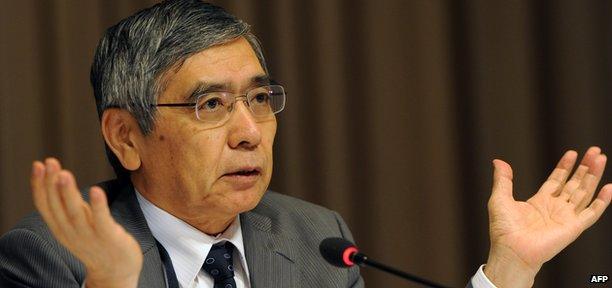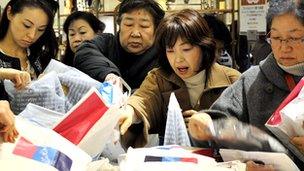Haruhiko Kuroda: Can he wave the magic wand for Japan?
- Published

Mr Kuroda will have to tackle a range of problems the Japanese economy is facing
In 2005, as the Japanese economy was showing signs of recovery from years of stagnant growth, Haruhiko Kuroda wrote a book titled "Success and Failure of Fiscal and Monetary Policy".
In it, he criticised the Bank of Japan (BOJ) for not getting its policies right at the most critical times for the Japanese economy.
Eight years later, as he takes charge of the central bank, at a time when Japan's economy is faltering, Mr Kuroda has a chance to put his theories into practice.
If he succeeds, the world's third-largest economy may find itself back on the growth track.
But a failure on his part may further compound the problems that many fear may cause irreparable damage to the Japanese economy.
"He has one of the toughest jobs in the world right now," says Yuuki Sakuri of Fukoku Capital Management in Tokyo.
"I don't envy his position at all."
'Everything is secondary'
The International Monetary Fund (IMF), where Mr Kuroda served as an assistant to the Japanese Executive Director during the early part of his career, describes him as "soft spoken but determined".
He earned a Master's degree in economics from the University of Oxford, where he studied under several prominent economists, including Nobel Prize winner John Hicks.
In an article, the IMF has quoted him as saying that his time at Oxford taught him that "good policies may require something that goes beyond just economic theory or analysis - some practical judgement, some good sense."
He will likely need all those characteristics - practical judgement, good sense and determination - in abundance in the coming months and years.
Mr Kuroda is taking charge of the central bank at a time when Japan's economy has been hurt by a range of factors.
Its exports, a key driver of growth, have been dented by a slowdown in demand from key markets.
Meanwhile, domestic consumption has been hampered by years of deflation, or falling prices, a trend which has seen consumers put off purchases in the hope of getting a cheaper deal later on.
These issues, which have seen Japan lose its position as the world's second largest economy to China, have now taken centre stage in Japanese politics.
The country's newly-elected government came to power after winning an election on a platform of promises to revive Japan's economic growth.
And Prime Minister Shinzo Abe has made it clear that he expects the BOJ to play a big part in that revival.
Mr Abe wants the central bank to boost its stimulus measures as well as take steps to help stoke inflation in the country.
During his campaign, he even threatened to change the law that ensures the BOJ's independence if the central bank does not take a more aggressive approach.
"As far as Japan is concerned, everything is secondary to fixing the economy," says Ed Rogers of Tokyo-based Rogers Investment Advisors.
'Enthusiastic partner'
This is where Mr Kuroda's appointment is seen as a key development.
He is a supporter of aggressive monetary easing as a means to revive Japan's growth. Many believe this played a key role in him being picked for the job.
Mr Kuroda has already indicated he will be far more hawkish with his policies than his predecessor, Masaaki Shirakawa, who was not an advocate of aggressive easing.
He has hinted that once he takes charge, the central bank may boost its asset purchase programme, a key stimulus measure aimed at keeping long-term interest rates low.
"I believe that [the BOJ] is not doing enough in terms of the size of its asset purchases or the range of assets being bought," Mr Kuroda told a parliamentary hearing ahead of his confirmation, earlier this month.
There are growing expectations that under Mr Kuroda's leadership, the central bank may start buying long-term government bonds,.
The BOJ has already been buying two and three-year bonds, but there are now hopes that it may start buying bonds with a maturity of five years.
The idea is that the central bank buys the bonds and the government uses the money from the sales to fund its various stimulus programmes.
"If that happens, it would signal an outright funding of the government by the BOJ," explains Martin Schulz of Fujitsu Research Institute.
Analysts say, that given similar views on monetary policy, Mr Kuroda and Mr Abe are likely to work very closely in their attempt to revive Japan's growth.
"I think he is going to be an enthusiastic partner with the Japanese government," says Mr Rogers.
Inflation target
But the biggest barometer of Mr Kuroda's success will be whether he can stoke inflation in Japan - seen by many as key to a revival of its economy.
For his part, Mr Kuroda has already said that achieving a 2% rate of inflation, a target set by the central bank earlier this year, after increased government pressure to do so, will be among his top priorities.
"Since monetary easing actions so far haven't been sufficient, I will take every measure possible to achieve [the] 2% target if approved as governor," Mr Kuroda said at his confirmation hearing.

Stoking consumer price growth is seen as key to an overall recovery in the Japanese economy
But some analysts warn that it is not going to be an easy ride on this front for him.
"Japan is an ageing society, where retiring households make a huge chunk of the population," says Mr Schulz.
"They are living on pensions and have been used to declining prices for years. They are not going to change their spending habits overnight."
At the same time, analysts say that wages in Japan have not grown enough for the younger population to have big spending power.
A stagnant economy has further hurt consumer sentiment.
Given all these factors, they say that it will take a long while for the central bank's policies to have a tangible effect on inflation.
"Mr Kuroda will not be able to achieve the 2% target at least for two years," says Mr Sakurai of Fukoku Capital Management.
"There is a limit to what the central bank can do. He will realise that the BOJ is not almighty God."
The yen dialogue?
Mr Kuroda once wrote a paper titled "Socrates: the Dollar Dialogue".
The paper discussed how the ancient Greek philosopher would analyse attempts by policymakers to manage exchange rates.
Ironically, in his new role Mr Kuroda is likely to be under constant scrutiny for exactly that - the exchange rate of the Japanese currency.
Expectations of aggressive easing by the BOJ have already seen a sharp decline in the yen. It has dipped more than 15% against the US dollar since November.
Some analysts expect the yen to decline further once the easing measures are announced.
While that is good for Japan, as it makes its goods more affordable for foreign buyers and boosts earnings of exporters, it is not so for other export-dependent economies in the region.
Countries such as South Korea compete with Japan in similar export markets so a sharp movement in the Japanese currency can have a significant impact on their trade.
However, analysts say this is where Mr Kuroda's international experience, especially with the Asian Development Bank (ADB), which he led since 2005 before taking on the BOJ role, may come in handy.
"During his stint with the ADB, he interacted with heads of all major central banks in the region and as a result has built good relations," says Mr Schulz.
"He will be able to explain to them Japan's situation and why the BOJ needs to be more aggressive.
"A key part will be to explain that Japan is not trying to actively devalue its currency, but that those movements are a result of policies that it needs to implement," he adds.
That may not be as easy as it sounds. But then, nothing about this job is likely to be.
It is clear that the Japanese government believes Mr Kuroda is the right man to take it on and in doing so revive the Japanese economy.
The only question is, can he succeed where others have failed?
- Published4 March 2013
- Published22 February 2013
- Published22 January 2013